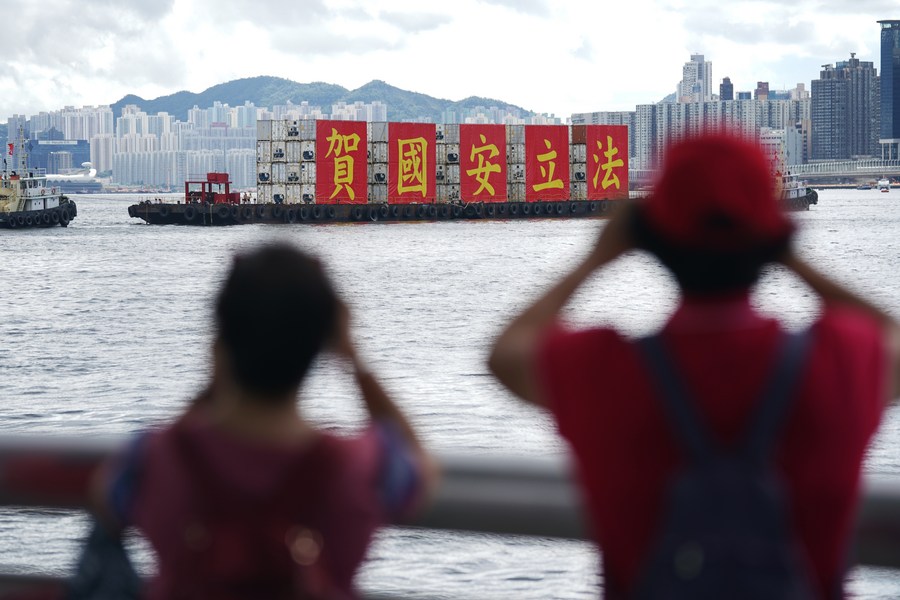
A ship carrying the slogan of "celebrating the passage of the Law of the People's Republic of China on Safeguarding National Security in the Hong Kong Special Administrative Region (HKSAR)" sails at the Victoria Harbor in Hong Kong, south China, July 1, 2020. (Xinhua/Wang Shen)
When the illegal acts of a minority of people endangering national security are curbed, businesses in Hong Kong no longer need to worry about their properties and shops being vandalized or burned, and residents here will be free from worries that they will get beaten up or "lynched" for expressing different political views, said a Hong Kong scholar.
HONG KONG, July 6 (Xinhua) -- The law on safeguarding national security in Hong Kong targets a tiny number of people endangering national security while protecting the freedoms of the general public, including the freedom from fear, a Hong Kong scholar said in a recent interview with Xinhua.
Lau Siu-kai, vice-chairman of the Chinese Association of Hong Kong and Macao Studies, said the legislation is a timely measure by the central authorities to deal with the severe threat to national security, as Hong Kong has been afflicted with year-long social unrest, and local opposition and external anti-China forces have stepped up their collusion in an attempt to seize the governing power of the Hong Kong Special Administrative Region (HKSAR).
The Law of the People's Republic of China on Safeguarding National Security in the HKSAR, which was adopted by China's top legislature and promulgated in the HKSAR on June 30, provides Hong Kong with legal means and instruments to fully and accurately fulfill its constitutional responsibilities under the "one country, two systems" framework, injecting new vitality into "one country, two systems," he said.
When the illegal acts of a minority of people endangering national security are curbed, businesses in Hong Kong no longer need to worry about their properties and shops being vandalized or burned, and residents here will be free from worries that they will get beaten up or "lynched" for expressing different political views, Lau said.
"The rights and interests of the vast majority of Hong Kong residents, including the freedom of speech, freedom from fear and personal and property safety, will be better guaranteed," he added.
After social stability is restored, the HKSAR government can focus on tackling the deep-seated problems in terms of economy and people's livelihood, which, he said, is conducive to the lasting prosperity of Hong Kong and the long-term well-being of Hong Kong residents.
The scholar said more explanations of the new law need to be made considering that the opposition forces have been smearing it to intimidate Hong Kong residents.
"In fact, many Hong Kong residents do not think the law will undermine their freedoms, because they know clearly that they will not commit crimes endangering national security," he said. "I believe more and more Hong Kong residents will feel even more at ease over time as the judicial practice unfolds."
